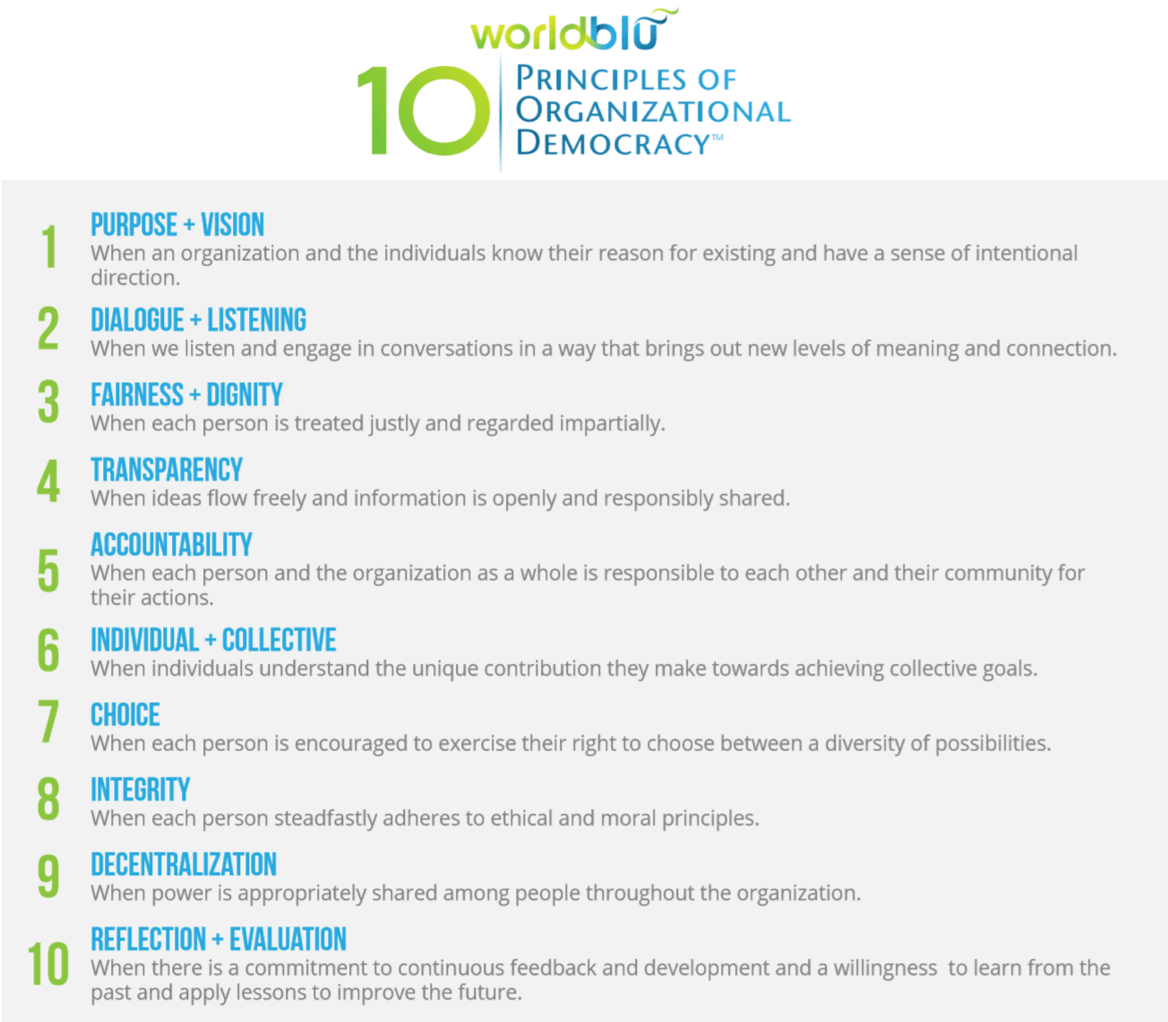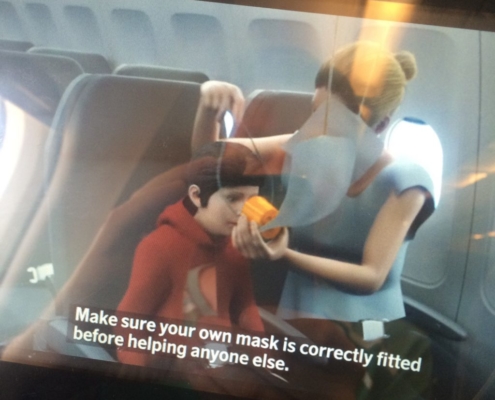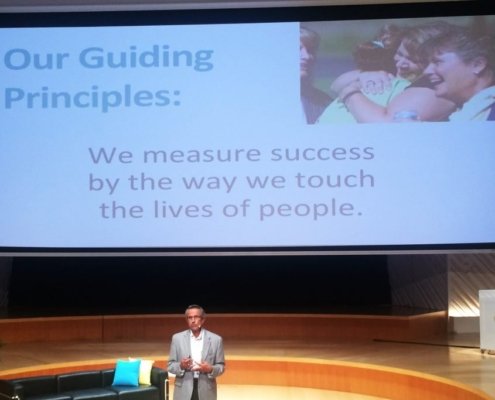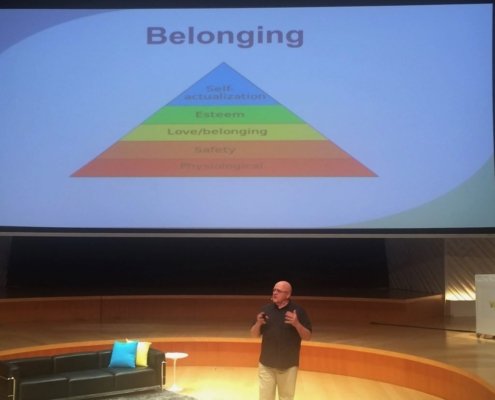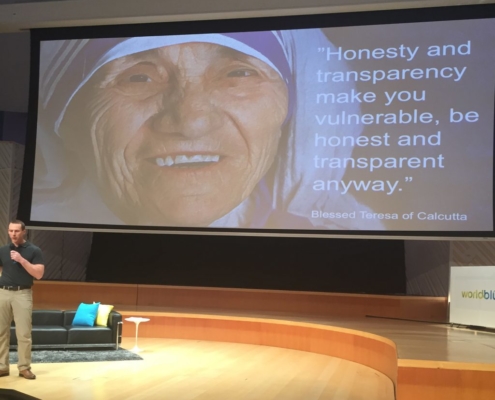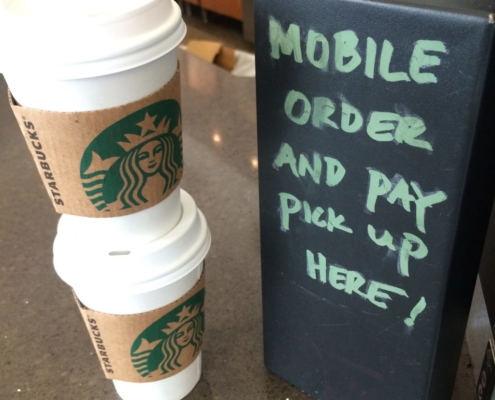The WorldBlu Summit 2016 // Part 1
By Erik Korsvik Østergaard, 17. May 2016
What is the Summit?
May 9-11 we visited the annual WorldBlu Summit in Miami.
This was my second visit, and my expectations were really high. Especially I looked forward to meeting the “tribe” and to refreshing all the connections. Huge learning was in sight just from that, which turned out very beneficial. The networking was great, and I have already established new projects and activities based on that.
Why would I chose a murmuration as the header image for this blog post? Read on and learn.
Freedom At Work
As described on WorldBlu’s website, their “purpose is to develop world-class freedom-centered (rather than fear-based), organizations and leaders. We do this by offering a range of products and services that make it faster, easier and more fun to deliver Freedom at Work™.”
The freedom-centered approach is based on these 10 very appealing principles of Organizational Democracy:
These principles resonate strongly with me, and I have used them for inspiration and benchmarking several times. Being caught up in the daily grind they admittedly slip out of my mind gradually, and the Summit was a great opportunity to get back on track.
@WorldBlu is my annual recalibration of my compass: Freedom and commitment, not fear and control #freedomatwork pic.twitter.com/niAO3tOi3N
— Erik Østergaard (@ErikQstergaard) May 8, 2016
The Power Question
The theme of this summit was The Power Question: What Would You Do If You Weren’t Afraid. Actually, that’s a pretty damn good question, and one that you should ask yourself from time to time. The point is, that in order to make great contributions in your organizations and in society, you need to let go of your fear.
FEAR was a general theme at the summit, and is intended to be seen as the opposite of FREEDOM. So, when working with your own fear (personally, in the organization, and on the global scale) you are capable of helping others.
The picture below is from the security briefing on the plane from Copenhagen to Newark, and perfectly shows the point:
Make sure you are on the right path yourself before helping others
What follows below are the things that stuck with me, and that I’d like to pass forward to you.
At the workplace
Bob Chapman, Chairman + CEO, Barry-Wehmiller Companies
“We need to care more”. Bob Chapman has written the book Everybody Matters, which I strongly recommend. It’s easily read (I did it on the plane home), and describes the journey that Bob himself and his companies have been on, putting people in center of everything. People is the product, not a resource in Bob’s world.
Garry Ridge, CEO, The WD-40 Company
“We’re in The Memories Business, not the oil can business”. Garry Ridge also spoke last year, and this speak had the same quality. Garry was awarded a Lifetime Achievement Award at the Summit for the work of WD-40 organization with regards to culture and employees. His book is a great how-to on practical leadership. “Leadership is about balancing tough minds and tender hearts.”
Matthew Gonnering, CEO, Widen
Matthew gave honest and personal examples of how he practiced leadership on a very intimate and caring level, e.g. frequently asking employees if he has let them down, thereby getting into some deep and genuine talks.
Also, he demonstrated several of the aspects of Agile Leadership, e.g. the weekly ten minute grand meeting for the whole organization, resembling that of a stand-up meeting.
We were so proud to award the Lifetime Achievement Award in Freedom at Work to Garry Ridge, CEO of @OriginalWD40 pic.twitter.com/aKgW78doGz
— WorldBlu (@WorldBlu) May 14, 2016
On global/societal level
Sam Chaltain, Author, Partner, WONDER
Okay, this is where the biggest value was for me. Sam Chaltain (from WONDER by design) opened with a strong message about the exponential behavior in technology, population, changes, and generally in society, thereby describing the singularity from an emotional point of view. It appeared as if several from the audience never had seen it that way.
This paved the way for his main focus, namely how to redesign learning so that kids in schools will master the right, updated skillset, and how we should focus on learning in organizations too. The fast-paced technological development called for new skills.
Finally, he showed a video of a murmuration, thereby illustrating the dynamics of organizations and networked people. A very strong message, that was the peak of the Summit for me, and really resonated with me. Several of my public speaks and engagements at clients have the same bearing points (singularity, innovation, experimentation, a shift in mindset, in skills, and in behavior), and we’ve already initiated a dialogue to further explore and expand Sam Chaltain’s work at WONDER by design.
Justin Dillon, Artist, Founder + CEO, Made In A Free World
Coincidental, I already knew of the site http://slaveryfootprint.org/, thanks to Reddit. Hence it was great to listen to the determination and profound passion of Justin Dillon, who ignited it all. Huge respect to this guy, being an inspiration when it comes to how much impact a single person can have.
What did I miss
I could easily have spent much more time listening to the organizational leaders and diving into the Future Of Work stemming from the vast advances in technology, and more Open Space on this would have been beneficial too.
Also, a walk-through of the 10 Principles Of Organizational Democracy with cases and learning would be great; maybe as a pre-conference starter.
Thoughts
To put this in perspective, consider these two real-life examples from the trip there, both pointing to advances in technology, automation, need for new skills, and need for new organizations, courage, critical thinking, and freedom at work.
Case 1: Automation in restaurants
The restaurants and bars in the airport in Newark were all equipped with table-mounted iPads, being your menu, payment system, and flight info.
You could – in your own tempo – browse the menu and design your order, swipe your Visa for payment, and get the invoice sent to your email. Only when the food is ready, you will be approached by someone from the staff. It actually worked great.
No pressure from the staff, no rush, no tech glitches, no stressed staff. Smooth. The automation is real.
Case 2: Starbucks is a bank; a case of disruption
We had our breakfast at Starbucks daily. To many Fintech experts, Starbucks is moving into the banking business. Some even say, that Starbucks is the 4th, or 17th, or 20th biggest bank on deposits (depending on the source, the political view, and the criteria).
This is due to prepaid orders, the mobile app, and that customers are more loyal to Starbucks than to their bank. They might be more willing to take a loan from Starbucks (to buy that new MacBook Air), than from their bank.
Your business is being attacked from unexpected fields. We need (a) a new set of skills and (b) courage and freedom
New skills are needed (as employee, leader, and organization). See my input on Responsive Leadership here. Less fear and control, and more freedom! We need to be creative, brave, courageous, and fearless (not stupid). And it starts in the schools too.
So, to summarize
- What would you do if you weren’t afraid?
- Make sure you are on the right path yourself before helping others
- The advances in technology demands a shift in mindset, in skill-set, and in behavior
- New approach to learning is needed, both in schools and in organizations
Thank you to old and new connections and friends, to the WorldBlu Crew, and to the many bright minds!
Looking for a thought-provoking speaker
with knowledge of the future
and how to turn it into daily life?
Our newsletter is filled with articles and tools
for the modern
future-oriented leader
Get free, useful tips and tools
that will help you navigate the future
and enhance your leadership already today
